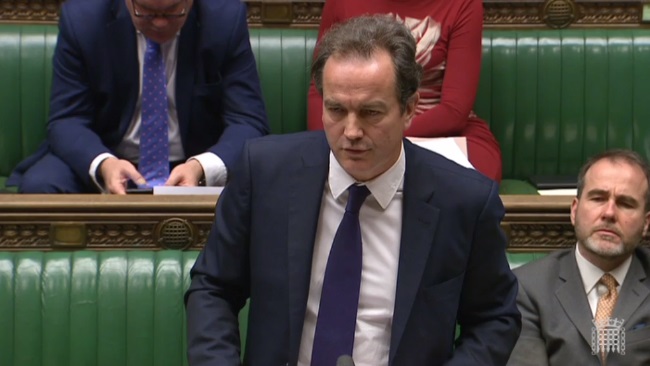Climate change minister Nick Hurd has rejected concerns over the possible asset stripping of the Green Investment Bank (GIB) following its privatisation, suggesting such a practice would be considered were the bank to remain a public institution.
Speaking during a House of Commons debate prompted by an urgent question from Green Party MP and co-leader Caroline Lucas, Hurd faced a barrage of questions from concerned members of all sides, including from within his own party.
MPs were expressing concerns following reports that the preferred bidder, widely regarded to be Australian investment group MacQuarie, had already engaged in sounding out potential buyers for GIB’s existing assets.
In response, Hurd claimed it was unreasonable to expect an investment group to hold on to assets if offered finance in exchange.
“Let’s not get ourselves into a position where just holding assets forever is a good in itself. I don’t think we would want that for GIB under its current structure,” he said.
“I don’t think it’s a sensible view that investment institutions should hold on to assets forever. Part of their role is to manage a portfolio and if they get attractive offers to divest assets, we’d expect them to look at them seriously.”
He overrode suggestions from Conservative MP Huw Merriman that the green share, established to be held by a board of trustees to protect the bank’s green purposes, could also be used to protect its existing assets.
Hurd also rejected calls from shadow secretary for business, energy and industrial strategy (BEIS) Clive Lewis alongside members of his own party and the SNP to implement a pause in the sale process until “genuine” protections could be put in place for the bank’s current assets.
Hurd, fresh from appearing before the BEIS select committee on Tuesday, also rejected calls from the SNP’s energy spokesperson Callum McCaig for assurances that any money made by the preferred bidder from asset stripping would be reinvested in green projects.
In particular, he failed to respond to numerous questions on the possibility of the GIB being able to invest in fracking once it had passed into private hands.
The debate follows reports that MacQuarie investigating how to sell off whole assets and stakes in projects after it has taken control of GIB, which would give the investment group control over the bank’s pipeline of work.
Citing commercial sensitivities, Hurd refused to name the Australian group as the preferred bidder throughout the session, despite Caroline Lucas opening the debate with a blistering attack on the company.
The Brighton Pavilion MP branded it a “profiteer asset stripper” with a “very worrying and dubious track record”, particularly regarding the environment.
MPs fear this would happen to GIB should MacQuarie emerge as its new owner, with Hurd unable to provide any guarantee that future investment would remain in the UK.
Instead the minister provided the government’s optimistic view of an incoming owner, saying it was interested in the future assets and investment of the bank, not the current state of an organisation looking to take it over.
The debate over the future of the GIB has raged since June 2015 when former business secretary Sajid Javid first announced plans to privatise the bank. Since then, the UK’s international standing and ability to attract renewables investment has dropped while changes to subsidy support for a range of technologies has fallen away.
According to Liam Kavanagh, founder and chief executive of renewable energy investor Rockfire Capital, the privatisation of the bank has highlighted the government’s stance on clean energy infrastructure.
“It would be a pity to let the Green Investment Bank get broken up by asset strippers. Fingers crossed the Commons help the government see sense. This process has exposed the government’s lack of commitment to the low carbon economy. We need to ensure our leaders understand the importance of funding in this area.”






